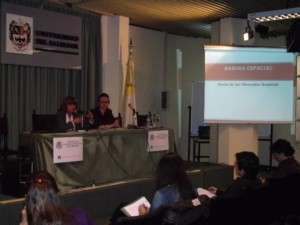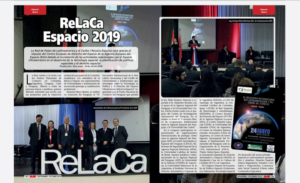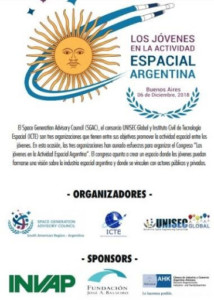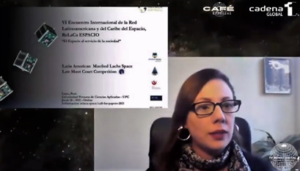Interview with María de las Victorias Cocca & Esquivel
International Secretary of the Latin American and Caribbean Space Network (ReLaCa Espacio)
By Itzel Rocillo
IR: Could you make a brief overview of your work in the Latin American space sector?
MVCE: Yes, gladly. My relationship with the space industry is lifelong. My father, Ambassador Prof. Dr. Aldo Armando Cocca was a pioneer in Space Law, worked on the elaboration of the international treaties that form the legal framework of outer space. My mother, Dr. Mercedes Esquivel is a specialist in Aeronautical and Space Law at the National Institute of Aeronautical and Space Law of Argentina.


I am a journalist from the Universidad Catolica Argentina, I have a postgraduate degree from the University of Salamanca in Spain in “Image and Political Consulting”. I am a specialist in aeronautical communication, space communication, political communication, science journalism and space technology surveillance.
I have presented myself in several National and International Congresses and I belong to several national and international organizations where I work in the field of international relations and communication.
I am currently the International Secretary of the Latin American and Caribbean Space Network (ReLaCa Espacio), an organization that managed to open the Latin American round of the prestigious Manfred Lachs Space Law Moot Court Competition.
I am also Director of Institutional Relations and Communication Council for Advanced International Studies (CEIA), an institution where papers were prepared and presented to the United Nations COPUOS.

Dra. María de las Mercedes Esquivel and María de las Victorias Cocca & Esquivel in a Conference managed by the Fundation “Casa de la Cultura de Córdoba” about space debris, 2011.
Throughout my journalistic career, I did several coverages on space issues in different media. For example, in 2013 I covered the launch of the “Centenary Experience” rocket. A great event, because a vector of the Argentine Air Force (FAA) was launched after 24 years of inactivity. I was the only licensed journalist with full access, which involved enormous responsibility and gratitude for trusting my work.
In mid-2016, I had the opportunity to work in institutional relations of the Aerospace Command of the Joint Chiefs of Staff of the Armed Forces of Argentina.
In 2017, a Meeting was held at the University of Salvador, in Buenos Aires, where an international interdisciplinary team signed the Commitment Act for the creation of the ReLaCa Espacio.
After a few weeks, I received the proposal of Dr. Marco Ferrazzani (Legal Counsel and Head of the Legal Services department at the European Space Agency) and Dr. Juan Manuel de Faramiñán Gilbert (Professor of Public International Law and International Relations at the University of Jaén) founders of the ReLaCa to be the International Secretary.

In 2020, I was distinguished by the Newberian National Institute as a Dame of the Newberian Order and joined as a member of the Institute.
I am also the Coordinator of Institutional Relations at the Civil Institute of Space Technology (ICTE).
IR: What role does information management play in the security of space activities?
MVCE: It is fundamental. The handling of information is broad, delicate and requires a lot of responsibility when it comes to information that is handled within an institution (in many cases confidential or reserved) or external (for the media or social networks).
The most frequent way of leaking information is through people outside the institution but who work for it and are, for example, in the stages of experimentation. In a rocket launch, there are cleaning personnel, firefighters, ambulance personnel, police, civil defense, etc. who rarely sign a confidentiality agreement where it is specified that they will not be able to give information or take photographs.
The leakage of information is a big problem due to ignorance or unconsciousness of how easy information can be obtained. For example, sending by mail or saving data that is not encrypted on computer media.
It is highly recommended to be trained through courses in technological surveillance, intelligence and cybersecurity. Many space institutions are governmental so they are issues that if not dealt with responsibly affect the state. By the way, while working in the General Director of I+D of the FAA, I promoted a space technology surveillance team, which allowed us to work in an interdisciplinary way, in an agile way and with an updated and complete vision of what is happening in the region.
IR: What are the challenges facing the institutions in the field of cooperation and exchange of information?
MVCE: We have many challenges ahead of us. Within the Communication team of ReLaCa Espacio we carry out research on communication needs in Latin America and the Caribbean. We identify the following problems as the most common:
- Scientific and technological illiteracy in space science.
We observed an increasing difficulty in understanding language about spatial disciplines. The growing sophistication and specialization of the branches of science and technology have become a challenge when it is publicized.
- The academic training of communicators:
Most people get information from the media and social networks from the choice of certain referents. Therefore, information is fragmented and biased. The most serious problem lies in the performance of the disseminators who, in many cases, transmit errors due to the lack of academic training in spatial communication.
IR: What could be the means to solve these challenges?
MVCE: I would say that it must first be to tackle the problems of education, because proper academic training is essential.
Likewise, experts must pass on their knowledge to the new generations since, in many disciplines, generational bumps were generated.
As a member of the ICTE and reLaCa Espacio, I managed to devise a course for the university that depends on the Argentine Ministry of Defense that is an initiative in progress where three axes are combined that have an interconnection between Space Law, International Relations in the space plane and Space Social Communication. The interconnection of these axes is not taught in Argentina and as for my area, Spatial Social Communication, it is not a matter in any country.
We believe that from teaching we can provide a contribution to training students with a complete vision, which is constantly updated, in an interdisciplinary way and with a global vision of the region.
There is also a need to improve spatial communication. We have the initiative of the Space Science and Technology Dissemination Programme that arose from the specific communicational need. We are awaiting the response of the Ministry of Science and Technology of Argentina. The mission is to disseminate government news, give visibility to entrepreneurs and university students.
Holding international events is essential. In all the institutions for which I work, we make conferences, courses and workshops that allow us to know the progress of the region of outstanding experts, young professionals and students.


Finally, I would say do regional Space Projects. The ICTE is working together with the Professional Council for Telecommunications, Electronics and Computing Engineering (COPITEC) on the initiative to create a regional university nanosatellite. The idea comes from the University of Palermo (Argentina).
IR: What is spatial social communication and what is its usefulness?
MVCE: Spatial Social communication is to bring the news to a much wider and heterogeneous audience, which implies a great knowledge of topics and languages.
Of course, in order to develop Spatial Social Communication, journalists have as a basis what we have learned from science journalism.
I think it is relevant the Decalogue of Ethics of the Scientific Communicator when says:
“The task of being a journalist also involves a way of being and thinking, it entails having an open mind and a great ability to question everything around you.”
IR: What means are necessary to implement by governments to disseminate the importance of space activities in Latin American society?
MVCE: Having an appropriate outreach system in place is essential as a tool to support countries space development policies. It is proven that good communication influences the decision-making of the authorities of the highest hierarchies since it favours the image of the official. Sometimes, that institutional support is accompanied financially.
In several institutions, “Communication Strategies” are increasingly used so that, through the news, certain opinions are generated, the image of the institution is enhanced or an undesirable issue is taken out of focus.
I believe that the rulers must constantly study and update themselves on certain issues of institutional communication in order to transmit their governance and reach the masses. Social media helps interact with the public. Several institutions publish by means of one-way communication and they do not respond to messages or comments. At worst, they censor the possibility of comment by the public.
At ReLaCa Espacio we work as a linking network for Latin America and the Caribbean in pursuit of international cooperation.
IR: How is the handling of relevant information in the context of a society with easy access to multiple sources?
MVCE: In ReLaCa Espacio we share news from other relevant actors for the Latin American space sector.
The rise of social networks the participation of institutions makes communication have immediacy, with an enormous scope that makes it possible to acquire data or information that was previously reduced to the reach of a few.
On the other hand, the proliferation of fake news has made the role of journalism and institutional communicators much more important. Today, the Internet gives us an enormous amount of information, most of the time impossible to process.
Unfortunately, institutional communication is seen in many institutions as “free propaganda”.
By the way, you can visit https://relaca.space/inicio for more information on the activities of the Network.
IR: What is the relationship between information, human rights and space activities?
MVCE: This is the first time I have been asked this question and I think it is very pertinent. I can remember my father, the Emb. Prof. Dr. Aldo Armando Cocca said that space should be a common good for humanity
IR: What tools can the government use to exchange information with private entities that develop space technology?
MVCE: Your question is crucial, as it is necessary to have a strategy to plan adequate dissemination of projects and their results.
Some communication campaigns have contributed to the success of space projects and the continuation of their financial support. I, therefore, believe that Governments should put international cooperation, which is essential for progress in space activities, on the agenda on space issues.
IR: Is there a difference between information generated by possible natural hazards and those generated by humans, such as satellites?
MVCE: In this regard, I noted that there are no regulations officially published within my country or at the international level, regarding institutional and social communications in the event of the fall of a meteorite or space debris. With the exception of U.S. Document “National Near Earth Object Preparedness Strategy and Action Plan” (2016).
I work on the protocol “Institutional and Social Communications before the fall of Objects From Outer Space that cause Emergencies and or Catastrophes”. Awareness-raising is envisaged on the importance of information at the time of disasters or catastrophes arising from outer space objects.
Access to information and knowledge are tools to reduce risks and disasters when caring for lives, reduce human suffering and material losses. To that end, a whole process must be made prior and constant through the monitoring of outer space, both within the country and also in collaboration with agencies or other space entities from abroad.
Of course, the ideal way to reduce the number and danger of emergencies and or catastrophes of objects from Outer Space, is a global cultural change, through the care of the Outer Space Ecosystem.
IR: Thank you very much for your interview. The dialogue has been very pleasant.


